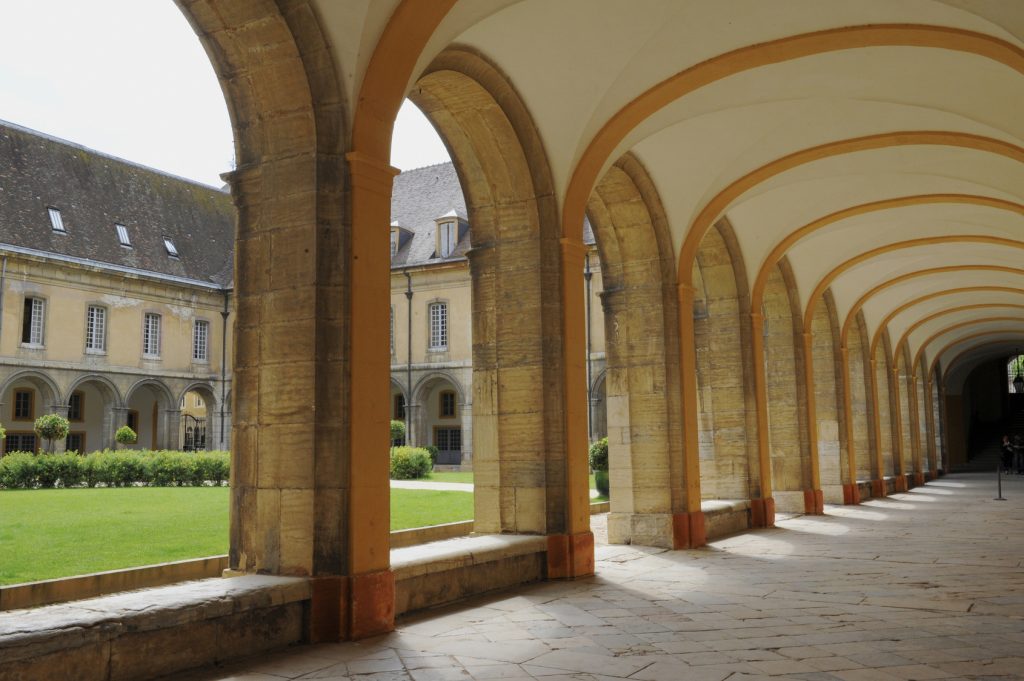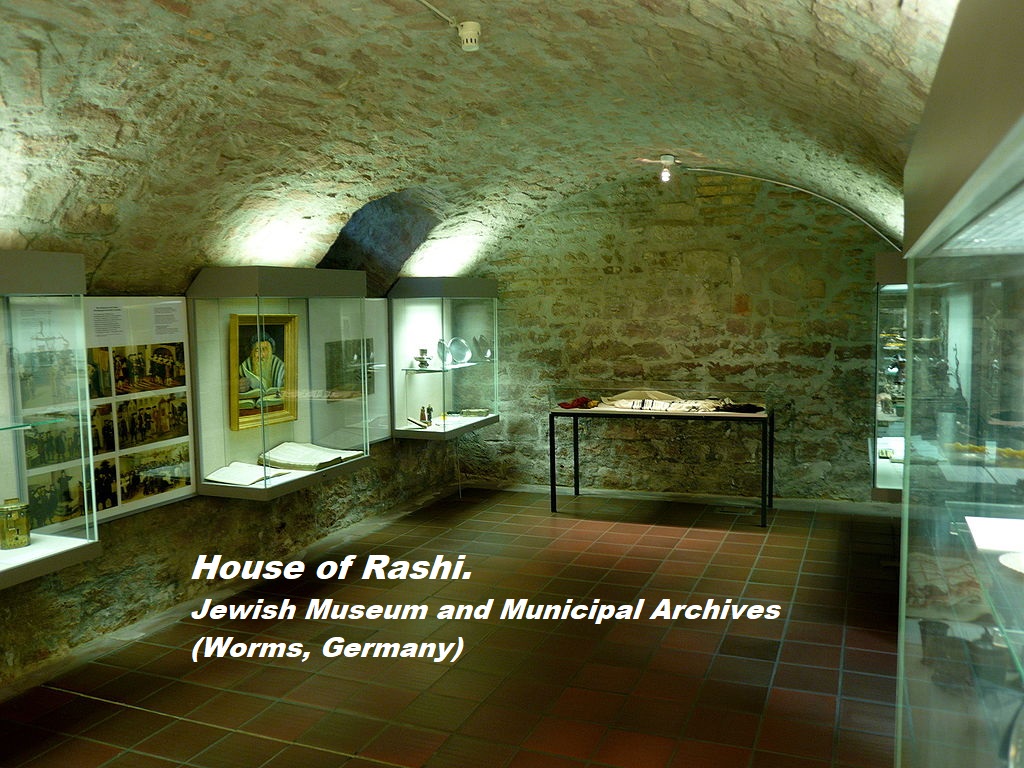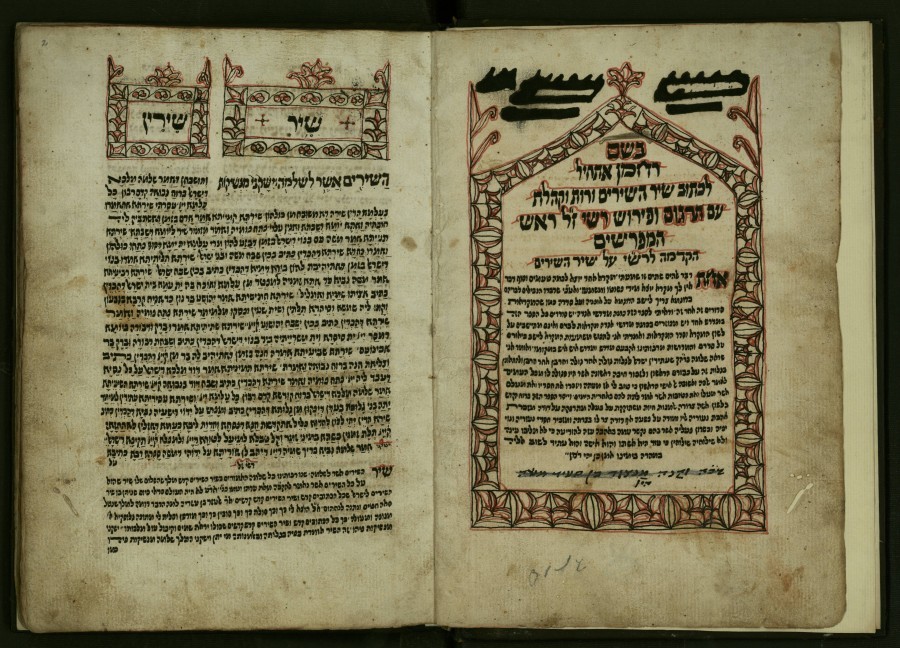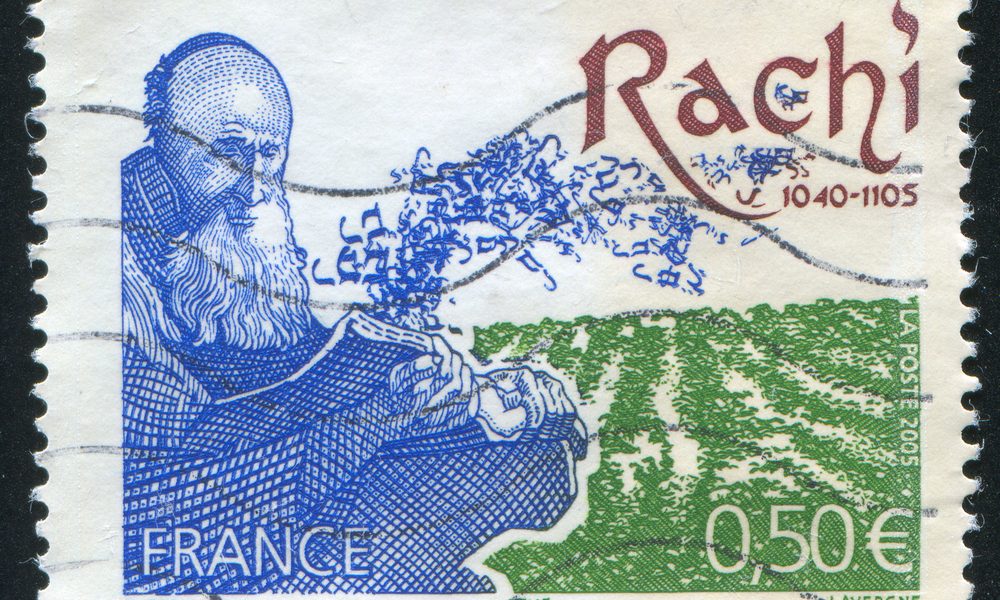
1050 AD to 1070 AD, Psalm 100: Rashi.
This site was first built in French (see www.147thgeneration.net). The English translation was mainly done using « google translation ». We have tried to correct the result of this translation to avoid interpretation errors. However, it is likely that there are unsatisfactory translations, do not hesitate to communicate them to us for correction.
(for that click on this paragraph)
Summary
This generation of the 1050s and 1060s.
According to our count, this generation is the 100th generation associated with Psalm 100. It is in this Psalm 100 that we therefore find an illustration of the facts of this generation.
At the beginning of the 10th century, the Catholic religion presents a face little edifying on the West. The invasions have pushed monks, relics and manuscripts out of monasteries, for several decades sometimes. Christianity Latin comes out of its torpor thanks to the impulse of the new communities such as the iconic Cluny. Finding the path of freedom and action, the renovation of the structure is possible, especially as the context lends itself to it, since the period that runs from the middle of the eleventh century to the end of the thirteenth century is characterized by a general boom (economic, demographic, urban, commercial) of the West. In parallel of the Cluniac movement, other movements go in the direction of renewal, in particular Jean de Gorze initiates a similar movement in the north of Europe. After forging its own religious forces, Europe is ready to free itself from Byzantine tutelage.
Europe is pregnant, the Jews of Europe still do not know the nature of the beast that is being born, even if some signs should worry them. Thus already in 1065 an expedition against the Muslims leads to atrocities against the Jews, early sign of the next crusades. In the meantime, the Jews are instead subject to measures that can be interpreted as favorable.
During this moment of relative respite, emerges the probably most influential personality of exile in the spiritual safeguarding of the Jewish people. It is difficult indeed to imagine what would have been the fate of the Jewish people, Ashkenazi and Sephardic confused, through generations to come without the enormous work of Rashi.
Rabbi Solomon ben Isaac, known as Rashi, born in 1040 to a family of scholars, he grew up in Troyes. He traveled to Worms (a community which will soon be wiped out), and became a student in the yeshiva of Rabbi Jacob ben Yakar, himself a disciple of Rabbi Gershom, then returned to Troyes. His purpose was to establish, by transcribing it, the oral tradition as well as the explanations of the text previously learned and to enrich them with the thoughts of his own. He remained the greatest commentator of the Talmud, the one to which one turns in the first place when the text presents a difficulty: a strange word, a passage whose tortuous reasoning is barely perceptible because of elliptic phrases which compose it, a complex game of references, obscure legal principles and apparent contradictions.
Rashi’s work, actually started in this generation, will allow the Jewish people to survive in a new world that will quickly reveal their hostility. It will strengthen the faith of the Jews by the role God has given them to the nations.
Talk
Cluny
The West, mainly Europe, marks its supremacy in this new millennium that opens, and at the same time, initiates a religious emancipation from the remains of the former empire of the second guard of the night: Byzantium, successor of Rome.
The foundations of this evolution started in the previous century:
- At the beginning [1] of the 10th century, the Catholic religion presents a face little edifying on the West. The invasions have pushed monks, relics and manuscripts out of monasteries, for several decades sometimes. In the opposite direction, the confusion of spiritual and temporal burdens, the simoniacal practices or the right of lodging introduced in the monasteries of the secular abbots and warriors accompanied by their family. Yet the recovery begins with lay people anxious to restore a church worthy of monastic foundations. […]
- (in 909), anxious to ensure the salvation of his soul, William of Aquitaine gives his estate of Cluny « to the holy apostles Peter and Paul » so that it is established a Benedictine monastery. […] By this privilege of exemption (the formulation makes it depend on the Apostolic See), the monastery escapes the interferences laic or ecclesiastical to raise only of Rome. Thus is set up one of the most powerful levers of the renovation of Western monasticism. […] The seeds of renewal are born in Cluny. […] The independence of Cluny is confirmed in 932. […]. During the first half of the eleventh century, under the long leadership of his abbot Odilon (994-1049), the order of Cluny became a rich and powerful organization, extended to England and Germany.
In parallel [2] of the Cluniac movement, other movements go in the direction of renewal, in particular Jean de Gorze initiates a similar movement in the north of Europe. After forging its own religious forces, Europe is ready to free itself from Byzantine tutelage.
Christianity [3] Latin comes out of its torpor thanks to the impulse of the new communities such as the iconic Cluny. Finding the path of freedom and action, the renovation of the structure is possible, especially as the context lends itself to it, since the period that runs from the middle of the eleventh century to the end of the thirteenth century is characterized by a general boom (economic, demographic, urban, commercial) of the West.
This generation confirms that we have entered the third watch of the night, that of the domination of the world by Europe.
Europe is pregnant, the Jews of Europe still do not know the nature of the beast that is being born, even if some signs should worry them. Thus already in 1065 an expedition against the Muslims leads to atrocities against the Jews, early sign of the next crusades.
Already opposed to the forced baptism of the Jews (he opposes in this sense in 1065 to the Prince of Benevento in Italy), Alexander II, pope elected in 1061, who transforms the reconquest into a holy war, still tries to limit it to only Muslims:
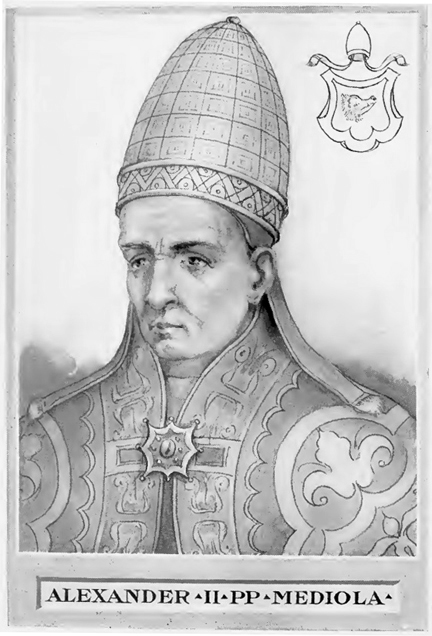
- When [4] the Crusaders of Spain exercise, en route, their warlike talents in attacking the Jews, Alexander II reminds them, in 1063, the distinction to be observed between Muslims and Jews: those, we must fight them because that they attack Christians and drive them out of cities, not these, the Jews, who are everywhere ready to serve.
It is listened to in Spain where the Jews will not undergo real Christian attacks in the next generations. This will not be the case elsewhere in Europe, when the first true Crusade will be formed. In the meantime, Jews in the rest of Europe are instead subject to measures that can be interpreted as favorable.
Worms and the legacy of Rabbenu Gershom
During this moment of relative respite, emerges the probably most influential personality of exile in the spiritual safeguarding of the Jewish people. It is difficult indeed to imagine what would have been the fate of the Jewish people, Ashkenazi and Sephardic confused, through generations to come without the enormous work of Rashi:
- Among [5] Rabbenu Gershom’s followers was Rabbi Jacob ben Yakar. The latter became the master of Rabbi Solomon ben Isaac, known as Rashi, formed from the first letters of his Hebrew name. Rashi was both the reflection and the creator of the lifestyle of Ashkenazi Jews. Born in 1040 in a family of scholars, he grew up in Troyes. […]
- He traveled to Worms, south of Mainz, and became a student in the yeshiva of Rabbi Jacob ben Yakar. […]
- Rashi spent many years in this yeshiva of Worms and then returned to Troyes. […]
- His purpose was to establish, by transcribing it, the oral tradition as well as the explanations of the text previously learned and to enrich them with the thoughts of his own. He remained the greatest commentator of the Talmud, the one to which one turns in the first place when the text presents a difficulty: a strange word, a passage whose tortuous reasoning is barely perceptible because of elliptic phrases which compose it, a complex game of references, obscure legal principles and apparent contradictions.
- In his commentary on the Bible, we discover the same desire for clarity. But it takes another form and seems destined for another audience. It is no longer addressed to those scholars who are bent over a page of the Talmud for long hours, but to the common man, cultivated, whose mind is however less disciplined in the study, to the craftsman pressed by his work, to the merchant. All more interested, even if they are students of Law, by the life of the men of the Bible than by an explanation of the terms and preferring a lesson of morality to a study of the structure of the text. […] Rashi’s comments owe their originality largely to philological explanations. There is less original commentary than a meticulous selection of the teachings of the anthologies edited by the Palestinian rabbis of the time of Rabbi Judah the Prince. This selection is made judiciously, it has been endowed with a worked style. Rashi chooses, in the vast literature of the Midrash, these stories, these values, these turns of phrases which, according to him, reflect and reinforce at the same time the deepest feelings of the Jews of his time.
Rashi
Rashi’s work, actually started in this generation, will allow the Jewish people to survive in a new world that will quickly reveal their hostility. It will strengthen the faith of the Jews by the role God has given them to the nations:
- Rashi’s work [6] was not intended to serve the ignorant masses; a certain familiarity with the biblical text and some of his difficulties are necessary to approach his work. But the Jewish community surrounding Rashi was not sophisticated and was less dedicated to questioning and philosophical inquiry than Sephardic communities. Their faith was simple and Rashi sought to reinforce it by his comments from the Bible. Israel is God’s chosen because only Israel has accepted the yoke of the Torah. The other nations refused it. Rashi repeats three times during his commentary this Talmudic point of view on the election. Israel is different from other nations, only Israel studies the Torah, a concern considered the highest virtue. Israel is therefore the nation closest to God and the one most dear to Him. The divine presence is in Israel even in the countries of exile, and all will be redeemed at the right time, when the righteous will be rewarded and the sinners punished. God and Israel are intimately bound by love and mutual dependence; it is an eternal and mystical union.
In the absence of a major political event, it is natural that the psalm of this generation pay tribute to the contribution of Rashi largely initialized during this generation by summarizing the message:

- A song for a thanksgiving offering. Shout to the Lord, all the earth.
- Serve the Lord with joy, come before Him with praise.
- Know that the Lord is God; He made us and we are His, people and the flock of His pasture.
- Come into His gates with thanksgiving, [into] His courtyards with praise; give thanks to Him, bless His name.
- For the Lord is good; His kindness is forever, and until generation after generation is His faith.

[1] Jean Pierre Moisset: « History of Catholicism ». Chapter: « One Church, Two Cultures: East and West » (French: « Histoire du catholicisme ». Chapitre : « Une Église, deux cultures : Orient et Occident ». (p. 178-179) ).
[2] According to: Jean Pierre Moisset: « History of Catholicism ». Chapter: « One Church, Two Cultures: East and West » (French: « Histoire du catholicisme ». Chapitre : « Une Église, deux cultures : Orient et Occident ». (p. 179-180) ).
[3] According to: Jean Pierre Moisset: « History of Catholicism ». Chapter: « The affirmation of Latin Christianity ». (French: « Histoire du catholicisme ». Chapitre : « L’affirmation de la chrétienté latine». (p. 185) )
[4] Bernhard Blumenkranz: « Jews and Christians in the Western World, 430-1096 ». Chapter: « The Jews in the city ». (French: « Juifs et Chrétiens dans le monde occidental, 430-1096 ». Chapitre : « Les Juifs dans la cité ». (p. 35) ).
[5] Chaim Potok: « A story of the Jewish people ». Chapter: « Christianity: Lost in the Enchanted Country ». (French: « Une histoire du peuple Juif ». Chapitre : « Le Christianisme : perdus dans le pays enchanté ». (p. 474-476) (extraits) ).
[6] Chaim Potok: « A story of the Jewish people ». Chapter: « Christianity: Lost in the Enchanted Country ». (French: « Une histoire du peuple Juif ». Chapitre : « Le Christianisme : perdus dans le pays enchanté ». (p. 478) ).

